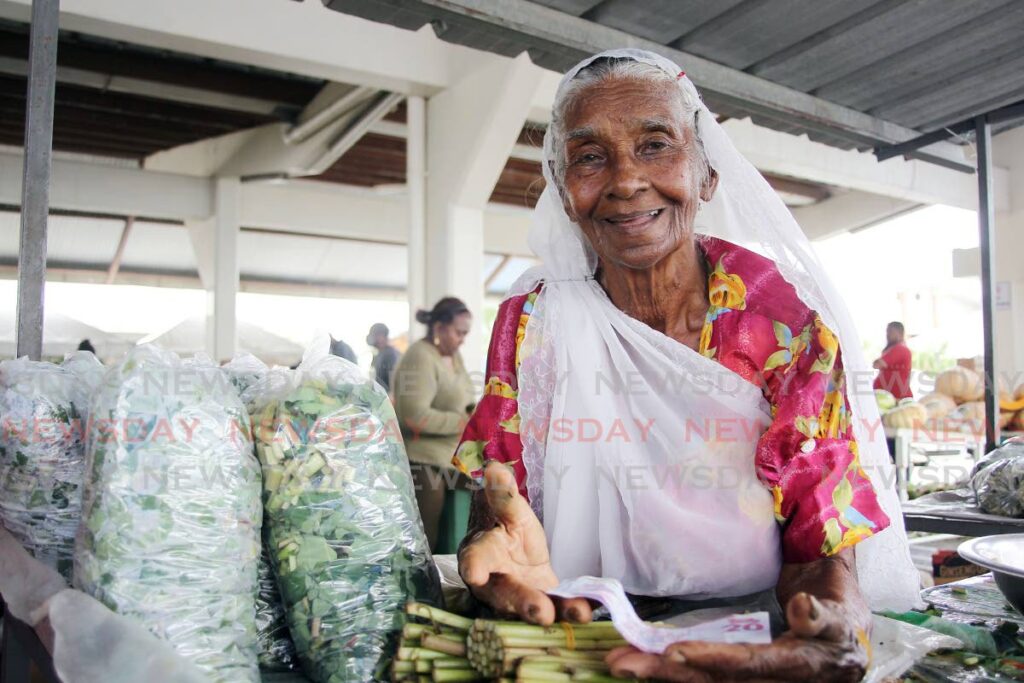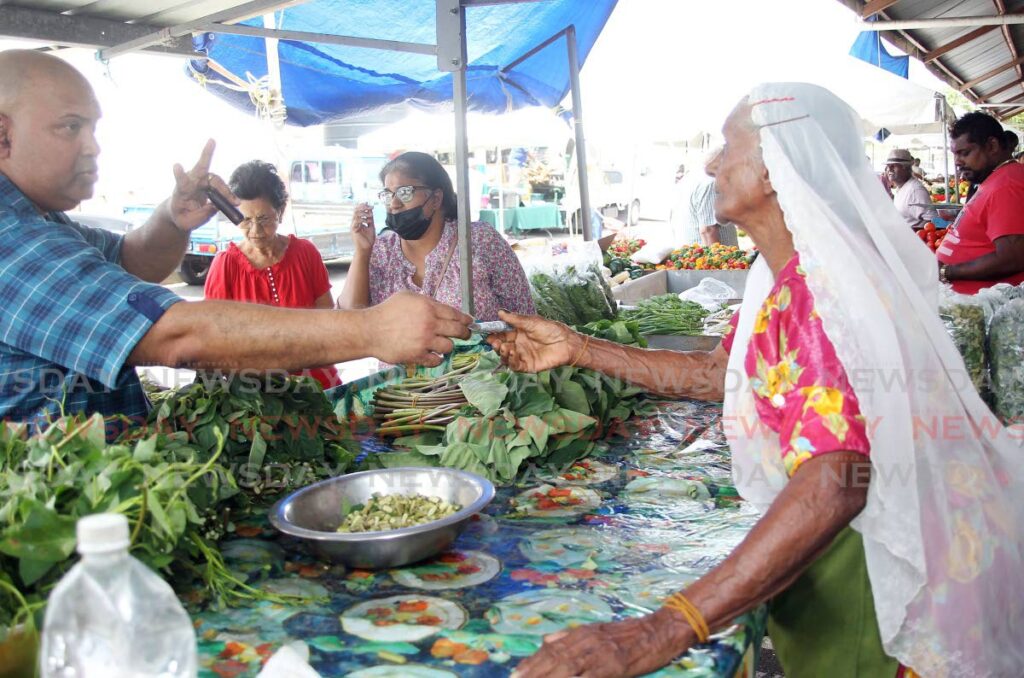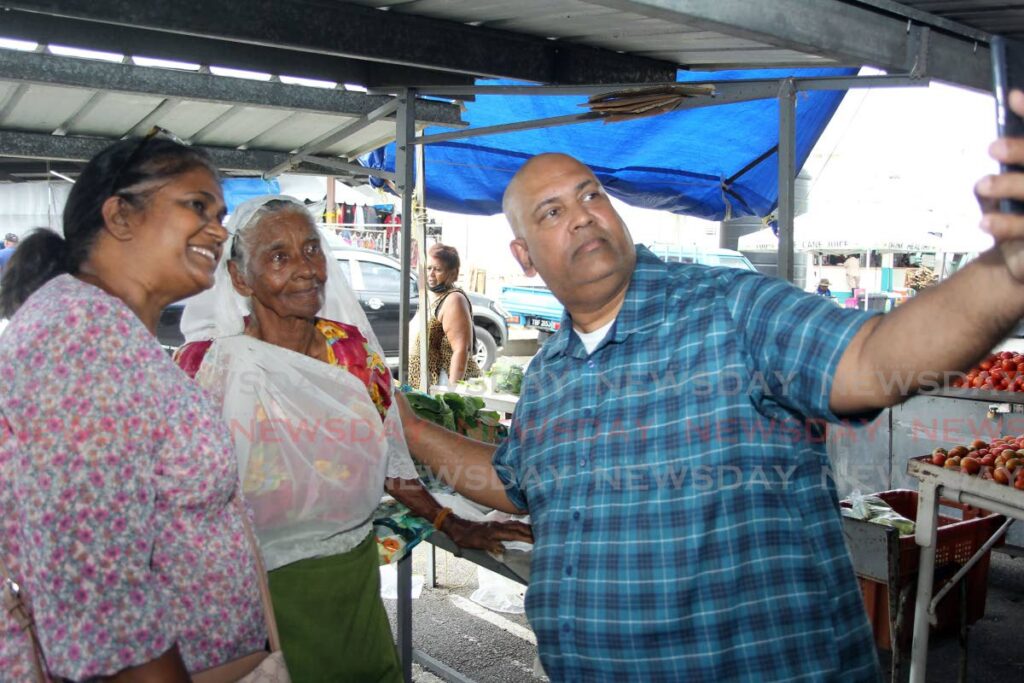Debe's oldest market vendor Ramraje Ramsawak

Market vendor Ramraje Ramsawak says she feels blessed to have reached the age of 103 but having outlived her husband and eight of her children she is ready to meet her maker.
She said there is nothing more she wants to do, that she has not done.
“I already have my white funeral dress and white orhni (a head covering worn by Indian women) and if they (family) get me vex I going to buy my box (coffin),” she joked in an interview at her stall at the Southern Wholesale Market, in Debe, on Thursday.
Ramsawak, said to be the oldest market vendor and gardener in TT, became somewhat of a local celebrity after a visit by Agriculture Minister Kazim Hosein, on the eve of International Women’s Day, when her photograph was shared on social media platforms.
She sells bodi, ochro, different varieties of bhaji she plants herself, with some assistance from other gardeners, at the Debe market stall she has occupied for over a decade.
Ramsawak said she has been a market vendor since she was age 20, a tradition passed on by her parents.
She previously sold her vegetables at the Mucurapo Street market, San Fernando.
Most of what she earns as a vendor she gives back to charity.
“My father come Trinidad from India when he was a baby. When he get big he married a Trinidad woman, so we is ‘Chinidad’ children,” she shared her heritage in broken English.
Married at age 12, she bore her husband, who preceded her in death 60 years ago, ten children. She cannot remember how many grand and great-grandchildren she has.

“Since he gone, I never take up nobody,” she said explaining that she remained single since his death.
While Newsday was interviewing her, several people dropped by her stall to say hello or buy her produce.
Among those were two ladies from Central Trinidad, who, while visiting relatives at nearby Palmiste, made the journey to the market just to meet her.
Speaking candidly about death, Ramsawak said, “I want to go right now. My clothes done make. I heaping up my bhaji money, one cent here, one cent there, to buy my box, so nobody eh go have to buy nothing for my funeral.”
The centenarian lives alone and admitted it is a lonely life.
“I want the Minister to visit me again. I want him to get me some company," she joked.
“I am in this house all day. I get up in the morning, bathe, go in my temple and go to the garden. Before the sun comes out, I am back home in my hammock where I spend the rest of the day.”
“When I am home, I am lonely, but when I come to the market, I am happy. I talk and laugh with everybody.”
Baldath Bisnath, who occupies a stall next to Ramsawak, said she is a priceless gem. He said he lives close to her in Debe and often visit her at her home.
He said she does her own chores, washing, cleaning and cooking.
“She would cook food and bring for me. She also does a lot of charity work, cooking and making prasad (an Indian sweet offered to a deity or saint), paying for all the ingredients from her own pocket, for weddings and prayers.
“She good, she has no major illness. She strong."
Ramsawak said her somewhat fading memory has limited her to travel on her own, so while she loves attending weddings and prayer meetings, she has to depend on others to take her to and from any event.
“I like to go to weddings and help cook food and see the ladies dance on maticoor night. I can’t dance again. I get too old,” she laughed.
Maticoor night is a part of the East Indian-Caribbean tradition for the soon-to-be bride and groom, usually held on a Friday night before the Sunday wedding at the bride's home. On this night, there is a lot of festivity with cooking traditional meals, dancing, singing and music.
While she experiences some pain in her body, and now walks with the aid of a stick after a fall, Ramsawak is in good health.
“My eyesight not so good, and I maybe have a little pressure (hypertension) and sugar (diabetes), because I like sweets. I tell the Minister I like cake and he sent a big cake for me. I put it in the fridge to share with my family and friends when they come,” she said.
She attributed her long life to working hard and to her strong belief in Bhagwan (God).
“I work hard, plant rice, cut cane, go garden with big belly (while pregnant). All my life was work, work, work. Now I tired, I just want to go home (heaven).

“When I gone, I want people to cook plenty food, good food and eat and drink and be merry.”
During Hosein's visit, Ramsawak shared stories about her life, travels, children, and love for agriculture.
Hosein described Ramsawak as an inspiration to all and said she embodied gender equality and empowerment of women and girls.
“Agriculture is an important engine of growth and poverty reduction; women are the backbone of all sectors, and agriculture is no different. Ramraje is an example of the strength of a woman who is determined to write her own story and live by her own rules, a story of power over adversity and one of independence," Hosein said.
The minister commended Ramsawak on her determination and quick wits, admiring the fact that she rises at 2 am to prepare for her daily chores, which include cooking, cleaning and her market duties.
Officials from the Ministry presented her with a plaque recognising her long-standing service and dedication to the sector and several food hampers. Hosein hopes Ramraje’s story will be a beacon of hope to other women to view agriculture as a viable career option.
“There are a number of training courses we continue to offer at the Ministry to assist women in Agriculture through the Extension Training & Information Services Division. There is also the Agricultural Incentive Programme, which is available to all citizens. There are many options available in this sector, and I hope to see more and more women occupy positions along the value chain.”

Comments
"Debe’s oldest market vendor Ramraje Ramsawak"